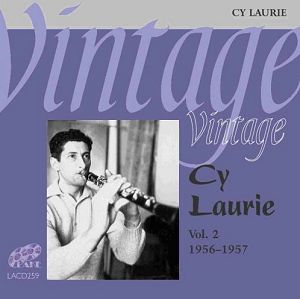Mad Dog
Goober Dance
Dippermouth Blues
Snake Rag
The Chant
Tuxedo Junction
Gatemouth
King Of The Zulus
The Girls Go Crazy
Ole Miss Rag
Memphis Shake
Lonesome Blues
Bow Tie Breakdown
Dippermouth Blues
You Made Me Love You
Froggie Moore Rag
Weeping
Cootie Stomp
Blue Blood Blues
Sock That Thing
Bull Fiddle Blues
Sunset Cafe Stomp.
This is the second volume
in Lake’s Vintage Cy Laurie series. The earlier
one was LACD 242 (reviewed here)
which covered some unusual pseudonymous sides
recorded for the American market – brisk,
two minute versions of standards. This release
differs. Nine of the tracks were made for
Melodisc and most of the others derive from
a concert performance from the summer of 1957.
All these sides are making their first CD
appearance.
By March 1956 the Laurie
band included Alan Elsdon and Graham Stewart
as front line partners – both highly impressive
exponents. Elsdon takes a nice, muted solo
on Goober Dance, Stewart reprises Ory’s
tailgate and the Doddsian Bootblacks ensemble
ethos is properly maintained throughout. On
a couple of the King Oliver tracks a second
trumpet, Pete Arnold, is added to add verisimilitude
but I preferred the attractively voiced The
Chant with a good Ian Armit solo and George
Mitchell-inclined trumpeting from Elsdon in
this Mortonesque outing. Tuxedo Junction
is engagingly laid back tempo-wise, Elsdon
growling when necessary and Stewart unleashing
one of his lazy ‘bone statements like a cat
unfurling itself by the fire. Diz Disley is
guest on Gatemouth – rather frenetic
– whilst some of the clarinettist leader’s
best playing is reserved for King of the
Zulus.
The Melodisc sound is typically
a bit sub-par. The band take a pumping Kid
Ory approach to Ole Miss Rag and on
these sides the band has rather more time
to stretch out. The trumpeter is Ken Sims
and the trombonist Terry Pitts. Sims has a
yen for Natty Dominique with his wavery vibrato
and tight mute work. The spirit of Jimmy Blythe
and Chicago barrelhouse permeated the band
in Bow Tie Breakdown, an original Laurie
composition; Weeping, another Laurie
piece, is fervent and passionately declaimed
by the leader. The last four tracks were recorded
in April 1957 and sound well; more Chicagoan
South Side here. I especially liked the easy
swing of Sock That Thing.
This is a fine selection,
far more characteristic of the Laurie band
than the compressed niceties of the earlier
disc. Johnny Dodds was Laurie’s God and he
celebrates him with his usual passionate conviction.
Jonathan Woolf
